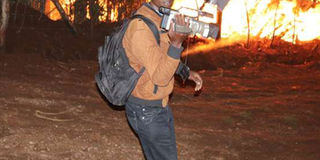Responsible media must respect law and report all sides of story

A journalist films the house of an ACK clergyman that was set on fire after he was accused of defiling a seven year old girl in Spring Valley estate, Embu County, on April 21, 2016. The rule in the code requires journalists to write fair, accurate, and unbiased stories on matters of public interest. PHOTO | CHARLES WANYORO | NATION MEDIA GROUP
What you need to know:
- The Media Act was replaced by the Media Council Act of 2013, which also includes the code. The NMG editorial policy and guidelines contain similar provisions.
- However, Kenyans, we have been told in poll after poll, trust the media more than any other institution. And what is reported in the media is generally taken as gospel truth.
Coalition for Reforms and Democracy (Cord) co-principal Kalonzo Musyoka said on Monday this week that the Independent Electoral and Boundaries Commission was working with a Korean institution to rig the 2017 elections.
He claimed that commissioner Thomas Letangule had travelled to Korea to seek help on programming the biometric voting registers to enable the IEBC to tamper with the elections.
The publication of the claim by the media greatly incensed the IEBC. Although both the Daily Nation and The Standard published the claim, the electoral body was concerned by the report in The Standard on Tuesday, which made the claim front-page news with the headline “Koreans hired to rig election, says Cord”.
Mr Andrew Limo, the IEBC manager of communication and public affairs, issued a statement on Tuesday condemning the publication by The Standard of “the reckless allegation” by Kalonzo Musyoka as headline news.
It said the claim was “part of Cord’s systematic but unfounded misinformation and propaganda”.
It said that was “irresponsible and carefree journalism”. Significantly, the statement said the commission’s response to the story was not sought.
The Daily Nation escaped the condemnation of the IEBC, apparently because it tucked away the claim somewhere in the middle of a bigger story on page 2.
But the claim in both papers was essentially the same. In both papers it was published without including comments from the Koreans, Mr Letangule, or the IEBC, contrary to a cardinal rule in the Code of Conduct for the Practice of Journalism in Kenya.
The code was voluntarily adopted by the media some 15 years ago and became the law of the land when it was incorporated in the Media Act of 2007.
The Media Act was replaced by the Media Council Act of 2013, which also includes the code. The NMG editorial policy and guidelines contain similar provisions.
THE RULES
The rule in the code requires journalists to write fair, accurate, and unbiased stories on matters of public interest.
It requires “all sides of the story” to be reported and “to obtain comments from anyone who is mentioned in an unfavourable context”.
The effect of the rule, if followed, is to ensure that readers are fully informed so they can make intelligent decisions about an issue without being manipulated by propaganda, hype, lies, misinformation, and disinformation.
Unfortunately the rule, as demonstrated in the two big stories of the week — the IEBC and the killing of businessman Jacob Juma —is the one most often violated by the media.
Yet it is so simple to follow, even when it appears impossible to cover all possible sides of a story.
It simply requires that if A says B is a thief, then the reporter must seek a comment from B. If B does not want to talk, that is still a comment.
The reporting of the two big stories of the week, without applying the cardinal rule, illustrates how propaganda works.
If you repeat a lie over and over again people will start believing it.
If you keep telling people that IEBC cannot be trusted and therefore must be dismantled or that Mr Juma was killed by the Flying Squad and therefore the State must be involved, people will start talking about it and eventually believing it, regardless of the evidence.
MEDIA TRUST
But it is not always as simple as that. Some lies are more believable than others, depending on the medium used, for example, whether it is the Daily Nation or The Standard, an ordinary whistle, or a dog whistle.
It also depends on our personal interest and values, emotions, ideology, social, and ethnic affiliation.
Lies can become impervious to evidence and reasoning if any or some of those factors are dominant.
However, Kenyans, we have been told in poll after poll, trust the media more than any other institution. And what is reported in the media is generally taken as gospel truth.
This is why it is so important for the media to respect the cardinal rule in the Code of Conduct for the Practice of Journalism: All sides of the story must be reported.
Send your complaints to [email protected]. Send SMS or call 0721989264





